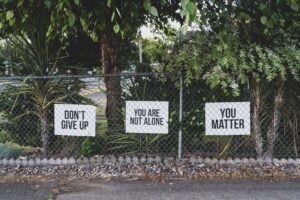A Guide to Healing: Trauma and Addiction Recovery
Addiction can wreak havoc on someone’s life. It could make each day a struggle to stay sober, not gamble the paycheck away, and complete daily tasks. Indeed, people struggling with addiction may start to feel hopeless and distressed. Research shows that there may be a link between addiction and trauma. That is, many individuals who grapple with the chains of addiction often experienced past traumatic experiences.
If you or your loved ones are struggling with addiction, the therapists at Mind Connections are here to help. Receiving therapy for addiction can help you regain control and start your healing process, especially in the realm of trauma and addiction recovery.
The Link Between Addictions and Trauma
Unresolved Trauma Can Leads to Addiction
Addiction is a disease that affects a person’s brain and behavior; this disorder causes them to use substances, such as drugs or alcohol recklessly. People can be addicted to taking different medications like opioids or drinking alcohol. Others are addicted to gambling, sex, pornography, food, the internet, mobile devices, and shopping.
Out of different causes of addiction, trauma is an important factor. In other words, addiction is not merely a physical dependence on substances; it’s a psychological battle. Often, individuals turn to addictive behaviors as a way to cope with unresolved trauma. The psychological mechanisms behind addiction can be traced back to a desperate need for relief from the pain that trauma inflicts.
According to NIH research, childhood trauma can elevate the “risk of substance use disorders (SUDs) because of attempts to self-medicate or to dampen mood symptoms associated with a dysregulated biological stress response.” Traumatic events can leave deep emotional scars, pushing individuals towards drugs or alcohol as an escape. Recognizing this link is the first step towards healing.
The Psychological Impact of Trauma
Trauma can manifest in various ways, such as nightmares and flashbacks, the typical symptoms of PTSD, as well as anxiety and depression. The long-term effects on mental and emotional well-being can be debilitating. Personal stories of addiction recovery often highlight the underlying trauma that fueled the addiction in the first place.
PTSD
PTSD (posttraumatic stress disorder) is a mental health problem that people can develop after experiencing or witnessing a life-threatening event, like combat, a natural disaster, a car accident, or sexual assault.
After experiencing these events, you might see signs that you have post-traumatic stress disorder. Here are some symptoms to look out for; You..:
- Find yourself reliving the event or constantly thinking about what happened (also called re-experiencing symptoms)
- Have intrusive memories (flashbacks, reliving traumatic events, & nightmares)
- Feel like you’re going through the traumatic event again and flashback to traumatic experiences in your life
- Become avoidant of anything that might trigger you about your trauma (for example, thinking or talking about the traumatic event, places, people, or activities)
- Feel paranoid that something terrible will happen to you and constantly feel anxious or alert (also called hyperarousal)
- Experience shame or grieve what you have experienced
- Experience hopelessness or numb in life.
Complex PTSD (C-PTSD)
Some people may not realize they are struggling with PTSD; they may believe that PTSD can only be caused by experiencing one major life-altering or threatening event in their life. However, this isn’t the case; other forms of trauma develop over time.
Someone can develop complex post-traumatic stress disorder (C-PTSD) after experiencing repeated or prolonged trauma, such as abuse, neglect, or captivity. C-PTSD is similar to PTSD, but it also includes additional symptoms like difficulty regulating emotions, problems forming and maintaining relationships, and a distorted sense of self-worth.
Ways to Help With Addictions and Trauma
If you are dealing with trauma or addiction, you deserve support. Don’t be afraid to reach out and ask for help; you do not have to go through these experiences alone. Addiction and PTSD are two disorders that can make someone feel very isolated; Here are some ways to cope with addiction and trauma in your life:
1, Recognizing the Addiction Problem
The journey to overcoming addiction begins with acknowledgment. Accepting that there’s a problem is the foundation of addiction recovery. It’s a profound, deep-seated acceptance of the reality that one’s life has been overtaken by addiction. This realization often comes with a mix of emotions – fear, shame, guilt, and sometimes even denial. It’s not uncommon for individuals to downplay their addiction, attributing it to stress, social habits, or just a phase. But true acknowledgment goes beyond these justifications. It involves looking in the mirror and admitting, without any reservations, that there’s a problem that needs addressing.
Accepting that there’s an issue doesn’t signify weakness. On the contrary, it’s a testament to one’s strength and self-awareness. It’s the first, yet most significant step in the recovery process. Without this acceptance, therapy and other interventions might only act as superficial solutions, never truly addressing the root of the problem. Only with genuine awareness of the addiction problem can it lead to the the possibility of healing and effective therapy.
2, Overcoming Stigmas and Challenges
External Prejudices
Unfortunately, societal misconceptions about addiction and trauma persist. Stigmas about mental health is unfortunately common. For instance, many people may view addiction not as a medical or psychological issue but as a moral failing or a sign of weakness. This perspective not only alienates those suffering from addiction but also discourages them from seeking the help they desperately need. Similarly, trauma, especially when it’s not visible, is often minimized or misunderstood. Survivors might hear phrases like “just get over it” or “it wasn’t that bad,” further invalidating their experiences.
Internalized Stigma
Meanwhile, you may feel ashamed about the things that have happened to you and your trauma or about your actions through addiction. In addition, it’s a personal battle as well. Many individuals internalize these negative beliefs, leading to feelings of shame, guilt, and isolation. This internalized stigma can be as damaging, if not more so, than external prejudices.
Overcoming the stigma of addiction and trauma is a challenge in itself. However, with self-compassion, awareness, and education, we can change the narrative and foster a more understanding society. Specifically,
Self-compassion
It involves recognizing one’s worth and understanding that addiction and trauma are not reflections of one’s character or value. By treating oneself with the same kindness and understanding as one would a dear friend, individuals can begin to heal from the inside out.
Awareness
It is about staying informed and understanding the complexities of addiction and trauma. By acknowledging that these are intricate issues often rooted in genetics, environment, and personal experiences, we can combat ignorance with knowledge.
Education
It plays a pivotal role in changing societal perceptions. By promoting accurate information about addiction and trauma, hosting community awareness events, and supporting research, we can replace myths with facts.
3, The Role of Social Support
Lean on Loved Ones
Social support is critical for individuals dealing with trauma or addiction. While seeking help from professionals is essential, relying on loved ones is also necessary. Opening up to someone you trust and sharing what you’re going through can be very beneficial. They may even notice symptoms that you might have missed. It’s okay to be vulnerable and honest about your struggles – there’s no need to feel ashamed. People who care about you will want to help you and see you get better.
Family dynamics can significantly influence the recovery process. While the role of family in trauma healing can be supportive, it’s essential to understand the boundaries. Families must educate themselves about the recovery process, ensuring they don’t hinder their loved one’s progress.
Join Support Groups or Find Others to Relate to
Social support is essential for individuals to overcome addictions and trauma. As we know, people who struggle with addiction often feel isolated and tend to hide their addiction. The power of community in healing from trauma is undeniable, offering a safe space for sharing and understanding. Seeking help from support groups like Alcoholics Anonymous (AA) and Narcotics Anonymous (NA) can provide a sense of community and accountability, increasing the chances of staying sober. Social support helps individuals with addiction keep on track with their recovery goals and feel more confident on their journey toward sobriety.
4, Seeking Professional Help
The importance of professional help in addiction cannot be overstated. Therapists and counselors trained in trauma-informed care and recovery can provide the necessary tools and guidance.
Therapy can also help people cope with addiction. Many times, people with addiction also have other mental illnesses going on in their bodies and minds. They can be struggling with addiction on top of feelings of, for example, depression. Mind Connections can help people deal with their co-existing conditions. We have therapists that are trained to provide support for anyone with depression, anxiety, trauma, and more.
5, Holistic Approaches to Heal from Addictions and Trauma
Beyond traditional therapy, holistic approaches to addiction treatment, such as yoga, meditation, and natural remedies for addiction withdrawal, have proven beneficial for many. Healing from trauma and PTSD is a journey of self-discovery. Mindfulness techniques for addiction recovery, such as deep breathing exercises and guided meditation, can be immensely helpful. Building resilience after traumatic events is essential, and support groups play a pivotal role in this.
Healing is Not a Linear Process
Healing is a journey that is full of ups and downs, and it is not always linear. Some days, you may feel like you are making significant progress, while on other days, you may feel like you have taken a step back. This is especially true if you struggle with addiction, as it can be a lifelong battle. It is important to remember that you are strong and resilient, and you have the power to continue moving forward on your healing journey.
The saying “help me accept the things I cannot change, the courage to change the things I can, and the wisdom to know the difference” reminds us to let go of the past and focus on what we can control. With addiction, it’s important to acknowledge the mistakes we’ve made and try to make amends but also to practice self-compassion and forgive ourselves.
Some relationships may not be salvageable, and you have to accept that as much as you might want to, you can’t change that. Instead, try and focus on healing yourself and letting go of the past version of yourself to make room for personal growth and positive change. By taking responsibility for our future behaviors, we can move forward and create a better life for ourselves.
Trauma Therapy and Addiction Treatment with Mind Connections
Our therapists at Mind Connections help people find tools for trauma therapy, addiction treatment, as well as build self-esteem, overcome fits of anger, heal from the past, grow in the future, and live happier/healthier lives overall.
Mind Connections also provides therapy for people experiencing PTSD. At Mind Connections, our therapists received advanced training to help you in your healing journey. We respect your decision and believe you will only reveal the past when you are ready. We will gently guide you and equip you with new tools in therapy. We implement different approaches to assist you, including:
- CPT (Cognitive Process Therapy)
- TF-CBT (Trauma-Focused Cognitive Behavior Therapy)
- Prolonged Exposure Therapy
- Psychodynamic Therapy
- DBT (Dialectical Behavior Therapy)
- Online Therapy
- Life Coaching
- EMDR (Eye Movement Desensitization and Reprocessing Therapy)
If you or your loved ones are struggling with addiction or the effects of PTSD, our therapists at Mind Connections are here to help. Mind Connections are proud supporters of Asian-Americans and the LGBTQ+ community. Call now to receive the support you deserve!
Content Creator, Victoria Gallo; Reviewed by Dr. June Cao




